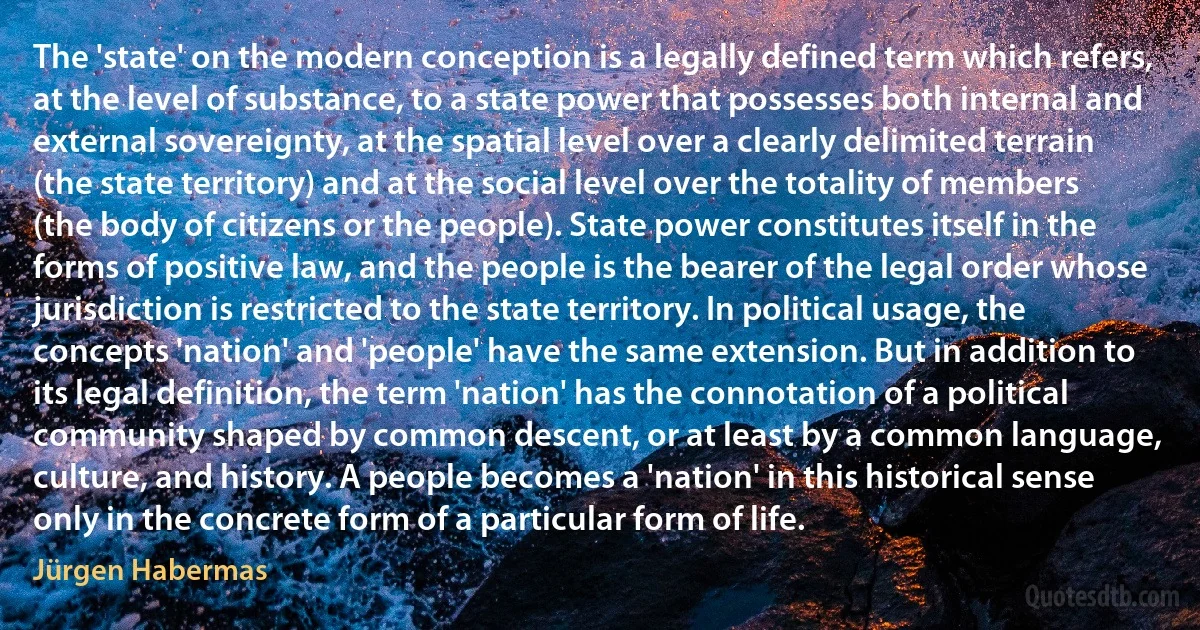
The 'state' on the modern conception is a legally defined term which refers, at the level of substance, to a state power that possesses both internal and external sovereignty, at the spatial level over a clearly delimited terrain (the state territory) and at the social level over the totality of members (the body of citizens or the people). State power constitutes itself in the forms of positive law, and the people is the bearer of the legal order whose jurisdiction is restricted to the state territory. In political usage, the concepts 'nation' and 'people' have the same extension. But in addition to its legal definition, the term 'nation' has the connotation of a political community shaped by common descent, or at least by a common language, culture, and history. A people becomes a 'nation' in this historical sense only in the concrete form of a particular form of life.
Jürgen HabermasRelated topics
body common conception concrete connotation definition extension form historical history jurisdiction language law least life nation order people power sense sovereignty state totality terrainRelated quotes
The shattering of modern culture is the result, on the plane of ideological struggle, of the chaotic crisis of these antagonisms. The new desires that are taking shape are presented in distorted form: present-day resources could enable them to be fulfilled, but the anachronistic economic structure is incapable of developing these resources to such ends. Ruling-class ideology has meanwhile lost all coherence because of the depreciation of its successive conceptions of the world (a depreciation which leads the ruling class to historical indecision and uncertainty); because of the coexistence of a range of mutually contradictory reactionary ideologies (such as Christianity and social-democracy); and because of the mixing into contemporary Western culture of a number of only recently appreciated features of several foreign civilizations. The main goal of ruling-class ideology is therefore to maintain this confusion.

Guy Debord
True Religion does not manifest itself outwardly, and impels man to no course of external conduct which he would not otherwise have adopted, but that it only completes his true In ward Being and Dignity. It is neither an Action, nor an incentive to Action, but a Thought:-it is LIGHT, and the One True Light, which bears within it all Life and all the forms of Life, and pervades their innermost substance. Once arisen, this Light flows on spontaneously forever, spreading itself forth without term or limit;-and it is as idle to bid it shine, as it would be to address such a command to the material sun when it stands in the noon-day heavens. It does this without our bidding; and if it shine not, then has it not arisen. At its uprising, Darkness, and the brood of spectres and phantasms which are born of Darkness, vanish of themselves.

Johann Gottlieb Fichte
Who is it who is responsible for the scheme of things whereby one man is engaged through life in grinding labour to win a bare and precarious subsistence for himself, and when, at the end of his days, he claims at the hands of the community he served a poor pension of eightpence a day, he can only get it through a revolution, and another man who does not toil receives every hour of the day, every hour of the night, whilst he slumbers, more than his poor neighbour receives in a whole year of toil? Where did the table of that law come from? Whose finger inscribed it? These are the questions that will be asked. The answers are charged with peril for the order of things the Peers represent; but they are fraught with rare and refreshing fruit for the parched lips of the multitude who have been treading the dusty road along which the people have marched through the dark ages which are now merging into the light.

David Lloyd George
The aims and ideals of the Soviet revolution inspired the patriotic enthusiasm of millions of people in the 1930s, during World War II, and in the postwar reconstruction period. This explains the Soviet Union's great leap forward, the achievement of a high level of industrial capacity in a very short time, the transformation of the Soviet Union into a major power in terms of science and culture. The historic victory in the Great Patriotic War against Nazism, which was a surprise not only for Hitler but also for the Western democracies is also explained by what we have said above. All this is true. But the historical truth is also that the regime and the system abused the faith of the people in these high ideals, turning them to its own advantage. Rule by the people, equality, justice, and the promise of a happy future - all these ideas were utilized for the sake of maintaining and strengthening totalitarianism.

Mikhail Gorbachev
My broad position remains firmly libertarian, sceptical of official cover-ups and uncompromisingly internationalist, believing sovereignty to be an almost total illusion in the modern world, although both expecting and welcoming the continuance of strong differences in national traditions and behaviour. I distrust the deification of the enterprise culture. I think there are more limitations to the wisdom of the market than were dreamt of in Mrs Thatcher's philosophy. I believe that levels of taxation on the prosperous, having been too high for many years (including my own period at the Treasury), are now too low for the provision of decent public services. And I think the privatisation of near monopolies is about as irrelevant as (and sometimes worse than) were the Labour Party's proposals for further nationalisation in the 1970s and early 1980s.

Roy Jenkins
